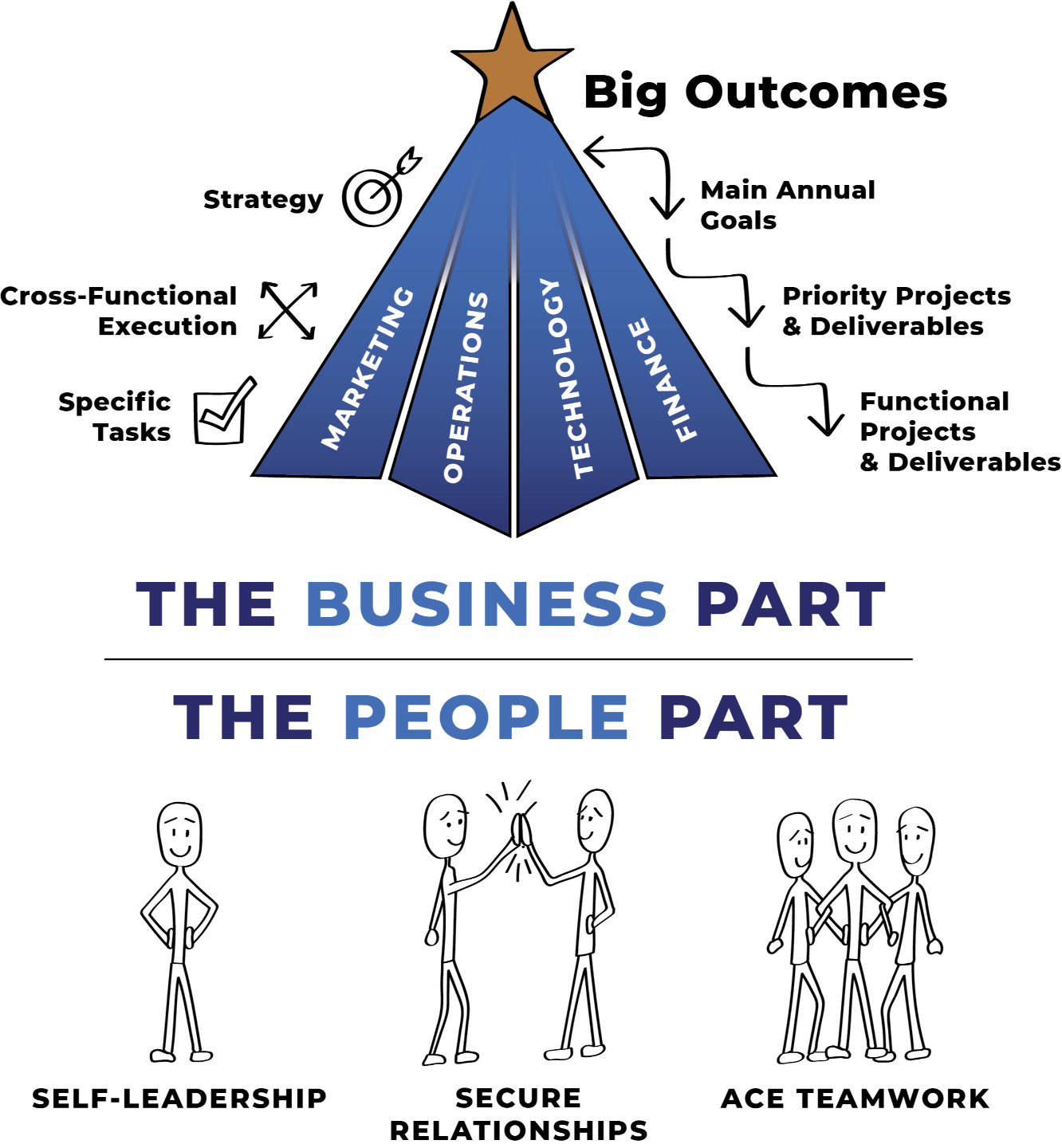Does This Sound Familiar?
If you're an entrepreneur or executive leader trying to manage changes in your company — whether they're internal or outside your control — you may be hitting roadblocks with your employees and operations that make you ask serious questions, such as...
"Do I have the wrong team?"
You ask this because:
- You're stuck in the weeds, caught up in day-to-day tasks instead of making high-level decisions
- You're not sure you can trust your team to do what really needs to be done
- You have no idea how to sort out these issues — and no time to do it, either
"Is it me or them?"
You ask this because:
- You're frustrated, and your team is overwhelmed
- They think your expectations are unrealistic, but you want them to think like leaders
- You put pressure on your team, but it doesn't seem to help
"How do I motivate my team to achieve results on their own?"
You ask this because:
- You've tried other methods to motivate your team, but nothing seems to work
- You feel like you're failing as a leader, and it seems easier to do things yourself
- You can't improve or innovate because of organizational issues you're facing
If So, I've Been Where You Are... and I Can Help.
I'm Annie Hyman Pratt
FOUNDER OF LEADING EDGE TEAMS
You need more than "junk food" business advice and half-baked motivational tactics. I know what it looks like to manage and scale a company with hundreds of employees and many moving parts. In the 90s, I took ownership of my family's business, the Coffee Bean & Tea Leaf, and grew it from 7 to 70 stores nationwide, shepherding it to a successful sale.
Since the sale of my company, I've engaged in interim C-suite executive work and top-tier business consulting. I've seen and solved business problems of all kinds, from complex turnarounds to the challenges presented by rapid growth. I have the expertise you need, and I'd love to help you solve the problems you're facing.
MEET ANNIE
Get a Fresh Perspective and Deep Experience
Here's what will happen when you decide to work with Leading Edge Teams:

We'll Meet You Right Where You Are
Nothing surprises us as we guide business leaders on a journey to discover how to efficiently function in their roles, while helping teams align to meet goals that consistently produce strong business results.

You'll Experience a Breakthrough
It is a shift for many to move away from being self-focused to Self-Leadership. This is the concept that will help you and your team adjust your focus in order to achieve extraordinary outcomes.

You'll Employ Strategies for Long-Term Success
Our proven methods provide the structure that allows team members to focus on achieving outcomes instead of distractions: ineffective meetings, chaos, & endless re-inventing of the wheel.
How the Leading Edge Approach Is Different
What we do is far from a "one size fits all" solution. For over a decade, Leading Edge Teams has had an unparalleled track record of helping businesses achieve massive, sustainable, team-driven growth — through proven methods and a customized approach for each client.
We firmly believe in the concept of Self-Leadership, and we teach leaders and teams how to utilize it for impressive results. From a place of Self-Leadership, secure relationships and trusted partnerships are built with owners, CEOs, executive leaders, and every person on the team. You'll go from frustration to freedom as your team handles their tasks efficiently — and you actually get to focus on steering the business toward scale and greater success!
LEARN MORE
You May Be Thinking...
Does this approach work, or is it just motivational talk?
"I would say that being in Annie's programs is grounding. It helps me to gain real traction with the most critical issues as an organization, which are the cultivation of the team which can turn great ideas into effective action."
—
OCEAN ROBBINS
CEO, The Food Revolution Network
This may work with some teams... what about my team?
"Annie’s approach to managing people has transformed our business here at Hay House and my life as CEO. Let her help you and your business too."
—
REID TRACY
CEO, Hay House, Inc.
Will this provide a short-term boost or real change?
"Having the structure to have difficult conversations, having the formats to hold people accountable, all of those tools are things that when we did not have we were winging it. Now it feels like we really have time tested tools."
—
LISA SASEVICH
CEO, The Invisible Close
Does Self-Leadership actually lead to practical results?
"When the CEO and I speak now, I volunteer more of my creative thinking about what I think we should be doing as an organization to become strong and work in a cemented cohesive way."
—
LIONEL CHURCH
COO, The Food Revolution Network
Take the Free Leadership Assessment
WHAT IS YOUR LEADERSHIP SUPERPOWER?

Your leadership superpower highlights the strengths that you contribute to business development, teamwork, and high performance outcomes. Gaining this awareness increases your business leadership abilities, your potential and achievement!
TAKE THE ASSESSMENTIt's Time to Stop Working in Your Business and Start Working on Your Business.
Discover how to help your team operate effectively so you can focus on what will ultimately move your business forward. Break free from the day-to-day challenges so you can make more strategic decisions that will help your company thrive.
SCHEDULE A CALL